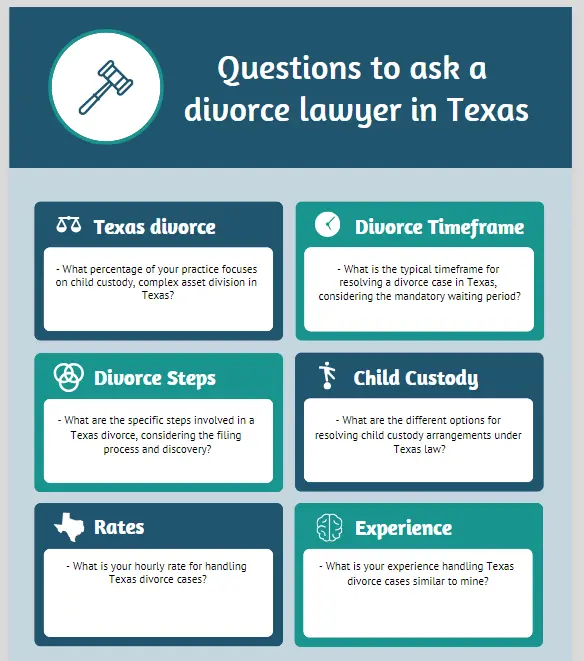Essential Questions to Ask Your Lawyer | Guide to Asking the Right Questions
The decision to end a marriage is never an easy one, and the legal process of divorce can be daunting, especially in a state like Texas with its unique laws and procedures. By asking insightful Questions to ask a divorce lawyer in Texas that are tailored to the Texas legal system, you can gain a deeper understanding of your situation, potential outcomes, and the expertise of your legal representation.
Preparing for your initial consultation with a divorce lawyer and asking Questions to the divorce lawyer in Texas is crucial to ensuring a smooth and successful transition. This comprehensive guide will equip you with essential questions to ask, empowering you to make informed decisions and protecting your best interests throughout the divorce process.
Table of Contents
Understanding Your Situation and Goals
Before your consultation, take the time to reflect on your specific circumstances and desired outcomes. What are your priorities regarding child custody, property division, and potential spousal maintenance? Having a clear understanding of your goals will allow you to ask questions that address your unique needs and ensure your lawyer understands your objectives.
Expertise and Experience in Texas Divorce Law Questions
Finding a lawyer with extensive experience in Texas divorce law is paramount. Consider asking:
– How many Texas divorce cases do you handle annually?
– What percentage of your practice focuses on [your specific legal issue, e.g., child custody, complex asset division] in Texas?
A lawyer’s level of experience and specialization in Texas divorce law can significantly impact the efficiency and outcome of your case.
Related Articls For You:
California Divorce Law 5 Year Rule Legal Process
Divorcing Because of Mother in Law

The Legal Process and Potential Outcomes in Texas Questions
Timeline and Process Overview Specific to Texas:
– What is the typical timeframe for resolving a divorce case in Texas, considering the mandatory waiting period?
– What are the specific steps involved in a Texas divorce, considering the filing process and discovery?
Understanding the legal timeline and process specific to Texas, including mandatory waiting periods and procedural steps, will help you manage expectations and plan accordingly.
Potential Outcomes and Risks Considering Texas Law Questions
– What are the different options for resolving child custody arrangements under Texas law?
– What are the potential financial implications of a divorce in Texas, considering property division (Texas is a community property state) and spousal maintenance?
Texas has unique laws regarding child custody, property division, and spousal maintenance. Exploring these potential outcomes with your lawyer will help you prepare for various scenarios and make informed decisions.
Financial Considerations in Texas Divorce Questions
Fee Structure and Billing Practices:
– What is your hourly rate for handling Texas divorce cases?
– Do you offer any flat fees for specific services related to Texas divorce proceedings?
– How will I be billed for court appearances, travel expenses, and other costs?
Transparency about legal fees and billing practices is essential for budgeting and avoiding unexpected expenses.
Financial Disclosure and Asset Division in Texas
– How will marital assets be identified and valued according to Texas law, considering community property?
– How is spousal maintenance determined in Texas divorces?
Understanding the process of financial disclosure, asset valuation, and division according to Texas’ community property laws is crucial for a fair settlement. Additionally, exploring the factors that influence spousal maintenance awards can help you prepare for potential financial obligations or entitlements.
Additional Considerations Specific to Texas
Building Trust and Rapport with a Texas Divorce Lawyer:
– What is your experience handling Texas divorce cases similar to mine?
– How do you keep your clients informed about Texas divorce law updates?
Finding a lawyer with extensive experience in cases similar to yours and a commitment to keeping clients informed about legal updates can significantly impact the outcome of your case and ensure you receive the best possible representation.

Alternatives to Litigation in Texas
– Are you familiar with Texas’ mediation process for divorce?
– What are the benefits of using collaborative divorce in Texas?
Exploring alternatives to traditional litigation, such as mediation or collaborative divorce (a process recognized in Texas), can potentially lead to a more amicable and cost-effective resolution.
Related Articls For You:
How To Pay For a Divorce Lawyer With No Money?
Essential Questions to ask a divorce lawyer during consultation
15 Questions to ask a divorce lawyer in Florida
LGBT Divorce Attorney
Conclusion
Handing a divorce in Texas can be a complex and emotionally charged process, but being well-informed and prepared can make a significant difference. By asking the right questions during your initial consultation with a divorce lawyer, you can gain valuable insights into the legal landscape, potential outcomes, and the expertise of your legal representation. Remember to take notes, ask for clarification when needed, and don’t hesitate to follow up with additional questions after the consultation. With the right legal guidance and a thorough understanding of your situation, you can approach this transition with confidence and protect your best interests every step of the way.
FAQs
1. What are the residency requirements for filing for divorce in Texas?
To file for divorce in Texas, at least one spouse must have been a resident of the state for at least six months and a resident of the county where the divorce is filed for at least 90 days.
2. What are the grounds for divorce in Texas?
Texas allows for both no-fault divorce on the grounds of insupportability (irretrievable breakdown of the marriage) and fault-based grounds such as cruelty, adultery, abandonment, or a felony conviction.
3. How is child custody determined in Texas divorces?
Texas courts prioritize the “best interests of the child” when determining custody arrangements. Factors considered include each parent’s ability to provide a stable, nurturing environment, the child’s preferences (if the child is at least 12 years old), and any history of domestic violence or substance abuse.
4. What are the tax implications of spousal maintenance and child support in Texas?
In Texas, spousal maintenance payments are generally deductible for the payer and taxable income for the recipient, while child support payments are neither deductible nor taxable.
5. What resources are available for low-income individuals seeking a divorce in Texas?
Texas offers legal aid services through organizations like Lone Star Legal Aid and legal clinics at law schools. Some lawyers may also offer sliding-scale fees or payment plans based on income.
By being prepared with the right questions and having a clear understanding of the Texas legal landscape, you can navigate the complexities of divorce with confidence and ensure the best possible outcome for yourself and your family.
About the Author

Sarah Klein, JD, is a former family law attorney with over a decade of courtroom and mediation experience. She has represented clients in divorce, custody cases, adoption, Alimony, and domestic violence cases across multiple U.S. jurisdictions.
At All About Lawyer, Sarah now uses her deep legal background to create easy-to-understand guides that help families navigate the legal system with clarity and confidence.
Every article is based on her real-world legal experience and reviewed to reflect current laws.
Read more about Sarah
About the Author

Sarah Klein, JD, is a licensed attorney and legal content strategist with over 12 years of experience across civil, criminal, family, and regulatory law. At All About Lawyer, she covers a wide range of legal topics — from high-profile lawsuits and courtroom stories to state traffic laws and everyday legal questions — all with a focus on accuracy, clarity, and public understanding.
Her writing blends real legal insight with plain-English explanations, helping readers stay informed and legally aware.
Read more about Sarah
